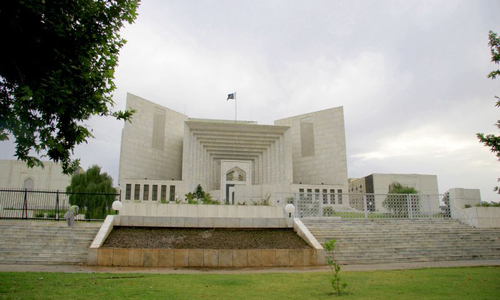ISLAMABAD: The retired Supreme Court judge Mushir Alam has declined an offer to serve as an ad hoc judge of the Supreme Court for a three-year term, citing his plans to serve society through a disability management centre.
“After careful deliberation, under the present circumstances, it is with a heavy heart that I regret to inform you that I am unable to accept this esteemed appointment,” Justice Alam said in a letter addressed to Chief Justice of Pakistan (CJP) Qazi Faez Isa.
Justice Alam was nominated for the ad hoc position in the upcoming Judicial Commission of Pakistan (JCP) meeting scheduled for Friday, July 19.
The JCP, chaired by Chief Justice Isa, will consider appointing four retired judges — Mushir Alam, Maqbool Baqar, Mazhar Alam Miankhel and Sardar Tariq Masood — as ad hoc members of the Supreme Court. Justices Baqar and Miankhel have expressed their willingness to accept the offer.
In his letter to the CJP, Justice Alam reflected on his career and future plans. He mentioned that after being laid off as a judge of the Sindh High Court (SHC) in 2007, he founded ‘Vision Trust’ and established an eye hospital in Karachi for the visually impaired.
Reinstated following a Supreme Court judgement, Justice Alam served as the SHC chief justice before being elevated to the Supreme Court, where he retired after a 22-year judicial career.
“It is an honour to be recognised for my legal expertise and contributions to society as a humble member of the bench,” Justice Alam wrote, expressing gratitude for the JCP’s consideration.
The former judge explained that long before his retirement from the Supreme Court, he had planned to resume the “unaccomplished mission to give back to society”.
“To fulfil this dream, I registered the Vision Health Care Foundation under Section 42 of the Companies Act 2017, with a mission to establish a Comprehensive Disability Management Centre,” he said. He acquired 15 acres of land in Pindi Gheb to serve people with various disabilities.
Justice Alam expressed his high regard for the JCP and the Supreme Court, thanking the commission for its trust. “I am confident that the Supreme Court will continue to uphold the highest standards of justice and integrity,” he added.
Justice Alam retired from the Supreme Court on Aug 21, 2021; Justice Baqar, who served as the Sindh chief minister during the last caretaker set-up, retired on April 4, 2022; Justice Miankhel retired on July 13, 2022; and Justice Masood on March 10, 2024.
If appointed, these judges will serve as ad hoc members of the Supreme Court for three years, in addition to the current 17 permanent judges of the Supreme Court. The top court’s sanctioned strength is also 17.
The decision to appoint ad hoc judges comes amid a rising backlog of Supreme Court cases, whose number has reached a staggering 54,000 cases.
The official note forwarded by the Supreme Court’s registrar suggested that despite best efforts, the cases continue to accumulate in the court.
The huge number of pending cases and the ever-increasing trend of instituting cases in the Supreme Court has led the court office to consider an effective way to ensure that more cases were decided than instituted to reduce and eliminate the cases pending adjudication for the last several years.
Chief Justice Qazi Faez Isa, in his note, stated that it would be appropriate to appoint experienced judges as ad hoc members of the Supreme Court since they could be appointed if they retired within the last three years.
Meanwhile, senior Pakistan Bar Council (PBC) member Munir Ahmed Kakar opposed the appointment of retired judges as ad hoc judges, calling it unconstitutional and a move to paralyse the judicial system.
Mr Kakar appreciated Justice Alam’s decision to decline the offer and vowed that the bar council would oppose such appointments with full force.
Published in Dawn, July 17th, 2024













































